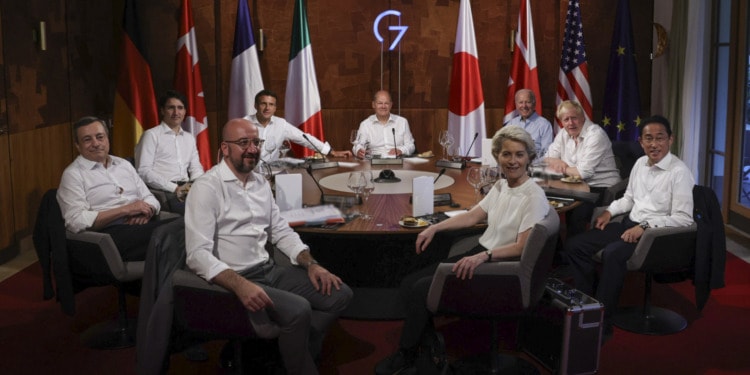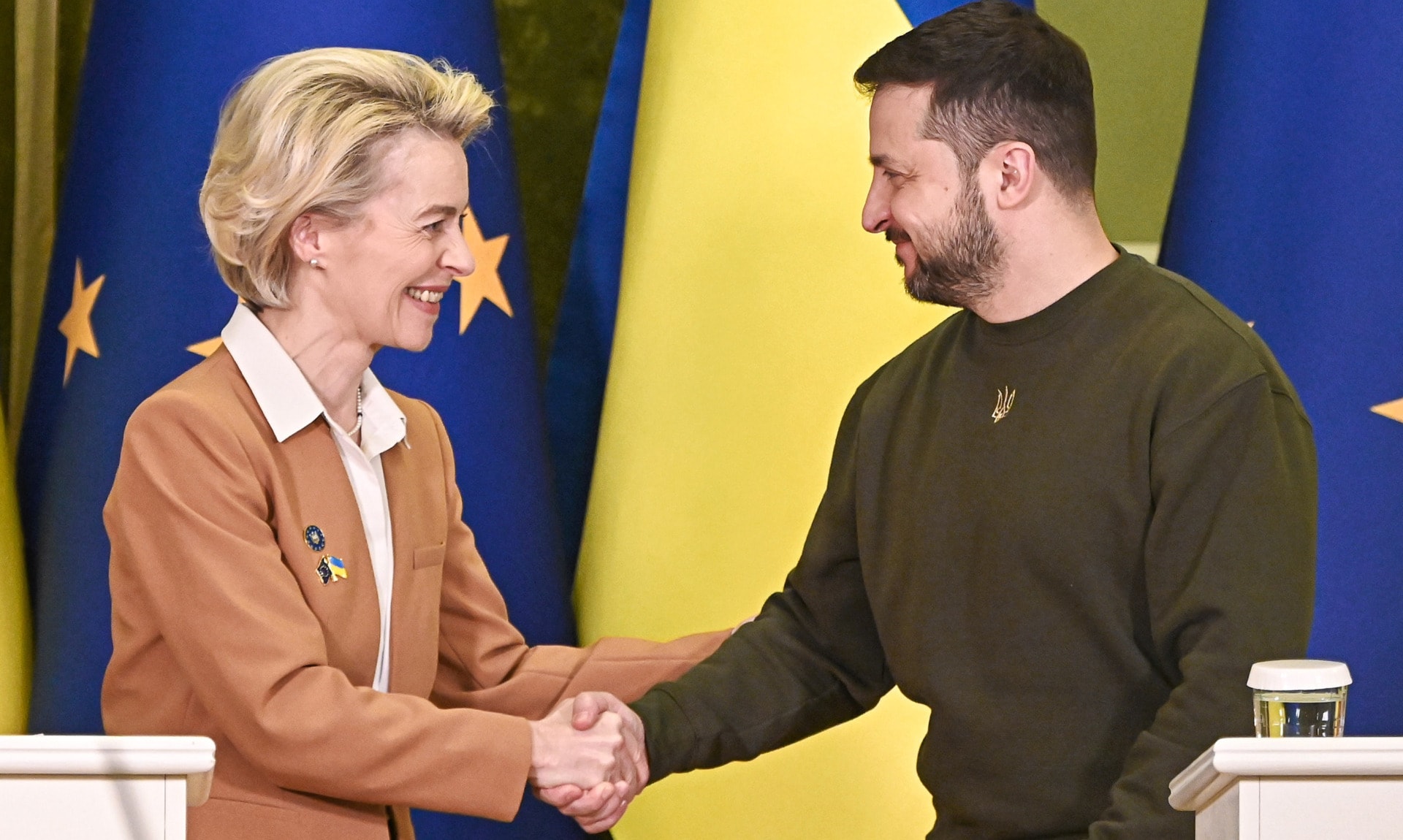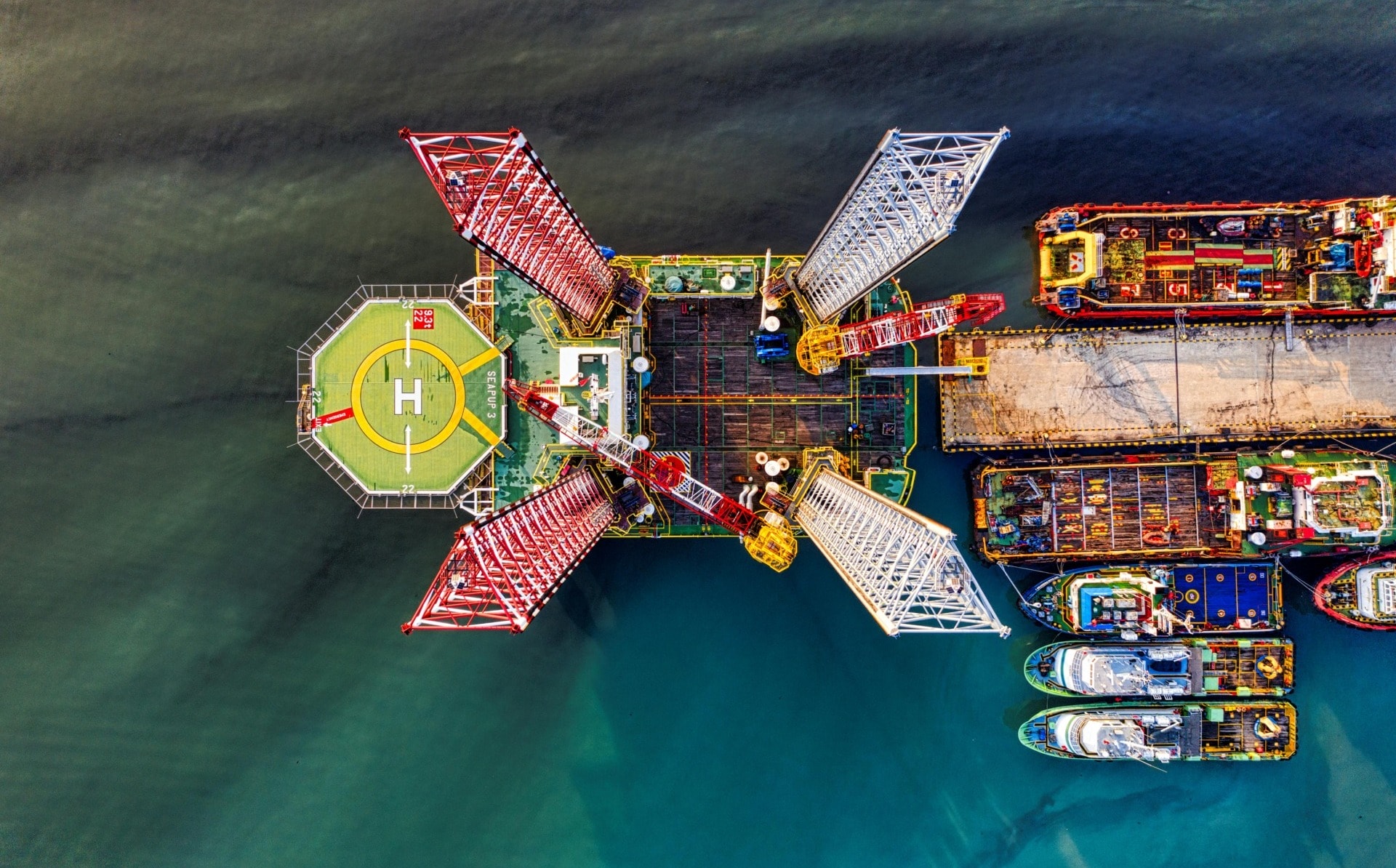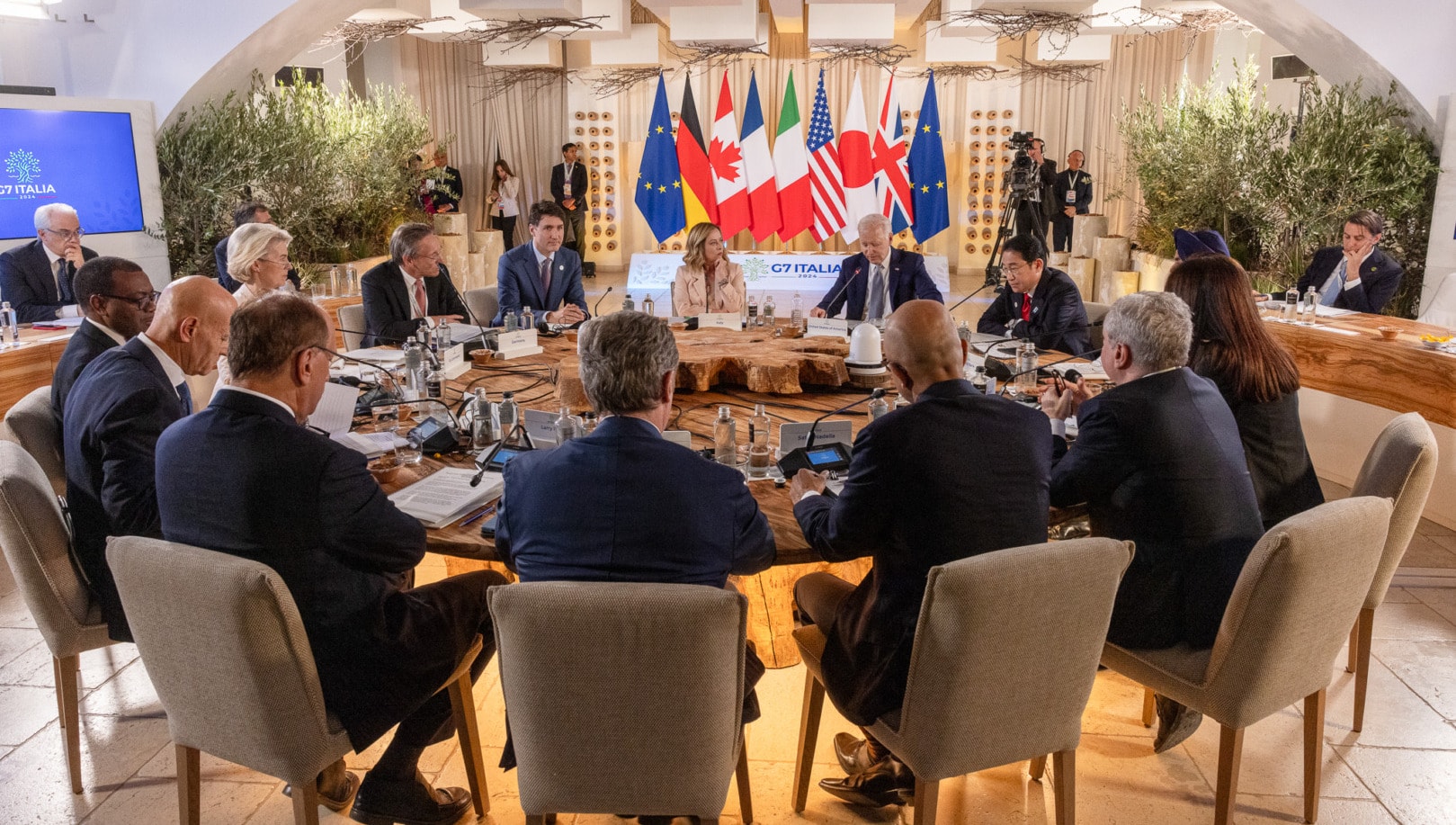Updated June 27 The G7 Summit started yesterday morning in a castle in Bavaria and the Ukraine war, sanctions against Russia, and the looming food crisis were obviously high on its agenda. In advance of this meeting of western leaders to which Russia is no longer invited since 2014 as retaliation for annexing Crimea, Russian President Vladimir Putin announced that he would be “in the coming months” transferring missiles to Belarus capable of transporting tactical nuclear weapons.
To be noted: That country headed by Lukashenko, a long-time friend of Putin’s, located on the northern border of Ukraine, is uniquely well placed to launch missiles on Ukraine’s major northern cities, Kyiv and Lviv. His announcement was punctually followed by bombs falling on Kyiv last night and damaging two buildings, causing two wounded.
In other words: Putin is telling the G7 that he means business. The implied meaning: Once Russia has taken the Donbas, it will turn to the rest of Ukraine, and will take Kyiv, no matter what – even if it takes a nuclear attack.
Unsurprisingly, the G7 responded in the strongest terms:
G7 countries will commit themselves to support Ukraine indefinitely, – Bloomberg.We will provide financial, humanitarian, military and diplomatic support and support Ukraine for as long as necessary,”the text of the draft statement reads. pic.twitter.com/zoVRzd6o7g#UkraineRussiaWar
— Ukrainian News24 (@MarkRid89403375) June 26, 2022
What that indefinite support is going to consist of is not yet known. According to Reuters last night (6 pm), there was talk of four of the Group of Seven rich nations moving to ban imports of Russian gold to tighten the sanctions squeeze on Moscow and cut off its means of financing the invasion of Ukraine. There is also talk of putting a possible cap on Russian oil prices – but clearly, that is not likely to be effective (Russia will always find buyers in a rising market).
This morning, the White House announced that the G7 vowed to expand sanctions against Russia with the aim to “further restrict Russia’s access to key industrial inputs, services, and technologies produced by our economies, particularly those supporting Russia’s armament industrial base and technology sector.”
The announcement said the U.S. government would “aggressively target Russian defense supply chains by imposing blocking sanctions on major state-owned defense enterprises, in addition to defense research organizations, and dozens of other defense-related entities and individuals and limit Russia’s ability to replace the military equipment it has already lost during its brutal war against Ukraine.”
Obviously, Europe will follow the lead but it’s likely to take some time since, as usual, EU sanctions require unanimous consent and Hungary is likely to put the brakes or drill holes in the sanctions or do both. And we need to remember that sanctions with holes never work.
Another possibility taking shape is putting “a cap on Russian oil prices”, a proposal made by U.S. Treasury Secretary Janet Yellen – but so far, not yet adopted, with German Chancellor Olof Scholz cautioning that it would be difficult to implement.
In short, “indefinite support” that includes no more than the provision of arms and (yet more?) sanctions on Russia is not likely to be enough or effective if Putin really means what he says: Is the West also going to tolerate a limited nuclear attack on Ukraine?
Does he really mean it? Who knows, opinions differ, but one should clearly take him seriously, more seriously than Merkel and other western leaders, including Trump, have ever done. In that case, what is the solution, and how to move forward?
Any G7 recommendation for better coordination of the sanctions against Russia won’t be enough. We need to remember that the 6th package of EU sanctions, the one aimed at Russian oil exports, is in fact incomplete. Because, as we all know, sanctions don’t work unless they are watertight – certainly not the case with this last set of European sanctions that – under pressure from Hungary’s Orban, another one of Putin’s friends – is anything but watertight. In fact, it will become fully applicable only two years from now.
Why the G7 should stop talking about sanctions
Any call from the G7 for “better coordination of sanctions” or “more sanctions” is pure nonsense, pap to pacify an increasingly angry public.
Because anger is palpable, we are all angry at the rise in energy and food prices, here in Europe, in America and elsewhere – see the problems in Ecuador where indigenous people have protested the rise in the cost of living by putting the capital under siege for 12 days. The situation there has turned into a government crisis and the president is likely to be deposed by the parliament.
And that is only the start. Watch what happens when the food crisis gets in full swing, as some 27 million tons of grain planned for export is stuck in Ukraine. It is believed that up to 4 million tons of grain and oilseeds are in the terminals and on ships stranded in ports, in particular in Odessa, Ukraine’s main port on the Black Sea. And nobody knows quite how to unblock that situation, with the Russian navy camped in front of Odessa and the sea full of Ukrainian mines.
And then there’s the energy crisis. With the spike in oil and gas prices, the biggest winner has been Putin despite the sanctions, whether coming from the US or Europe.
I have deliberately bolded the above sentence because that is the main point here: Sanctions have created a situation that has benefited Putin, filling Russia’s coffers with money and permitting him to happily go on waging his war.
In fact, the ruble has never been stronger – hitting the highest level in 7 years despite the sanctions – whereas the normal expectation would be that a country at war sees its currency weakened. Nothing like that happened because Russia is a petro-state, and if the price of petrol goes up, it gains. And that’s it, pure and simple.
Khodorkovsky, a Russian oil tycoon and former Putin friend, now one of his staunchest critics, has no doubts: As he recently told Politico, sanctions don’t work, “Europe is sabotaging itself”.
What should the EU have done? In his view, it should have secured alternative supplies before moving ahead with an embargo, or even taken another approach entirely, simply imposing tariffs on Russian energy rather than an outright ban.
He’s not the only one who argues like this: several experts from the Bruegel think tank have pointed out that it would have been smarter to impose tariffs since redirecting oil to other countries with the infrastructure currently in place would have been difficult for Moscow. This would have forced Russian energy companies to absorb the higher export costs to Europe, reducing their margins and ultimately cutting into Moscow’s military budget.
The point is this: By “drilling a hole in its own finances”, Europe has become weaker and less able to finance the purchase of more weapons for Ukraine.
Khodorkovsky has no doubts: “The problem is that current Western politicians have never held talks with a gangster,” he said, referring to Putin. “You can only start negotiating with him when he feels like he’s in a weaker position.”
And the sanctions have been a clear boomerang. “How much has the West lost in revenue by introducing all kinds of energy sanctions? $100 billion, $200 billion?” he said. “Had Ukraine got at least $50 billion worth of weapons instead of $10 billion, the situation would be completely different now — without any energy sanctions being introduced.”
The EU revised downward its growth predictions for this year by around 1 percent in April as a consequence of the war in Ukraine (and sanctions of course) that has so far cost some €160 billion, according to recent GDP estimates from the International Monetary Fund. Meanwhile, the EU has set up several tranches of financial aid, now amounting to €2 billion toward the purchase of arms for Ukraine.
Those numbers speak for themselves: One has to wonder what our political leaders were thinking.
If not more sanctions, what? Lower oil prices by flooding the market
If it’s too late to slap tariffs on Russian exports (although that measure is always available), why not simply turn to Saudi Arabia with whom America has close ties (ever since President Bush and of course Trump) and obtain, with Saudi support, a shift in the OPEC oil policies?
Flooding the market with oil would instantly lower prices and cause a structural problem for Putin whose financial spigot would suddenly dry up. This would weaken him, and, as Khodorkovsky says, in his gangster mentality, this is something he understands. Low energy prices coupled with continuing to arm Ukraine, is probably going to be all that’s needed to corner him into negotiating for peace.
The advantages of low energy prices however don’t stop there. With cheap oil, you could transport Ukraine’s tons of wheat overland and don’t need to use the sea route from Odessa that is currently blocked by the Russian navy and Ukrainian mines.
Putin may feel he has leverage on the world that fears a looming food crisis and he has even come out in so many words, saying he was ready to discuss some sort of agreement – a swap, if you will, for lifting sanctions against allowing Ukraine wheat to be exported. Obviously, so far, nobody in the West has responded to this specific proposal, and nobody is likely to.
Given the impasse on a grain agreement, it is smarter to attack Putin from another angle, the “oil angle.” And while the sea route for Ukrainian exports is now blocked, nothing stops Ukrainian farmers from sending their grain through other routes, the ones followed by refugees so far, that is, on land, mainly through the Moldova and Polish borders.
Food crisis solved!
Editor’s Note: The opinions expressed here by Impakter.com columnists are their own, not those of Impakter.com. — In the Featured Photo: G7 leaders with EU Commission President Ursula von der Leyen and Charles Michel, President of the European Council.














